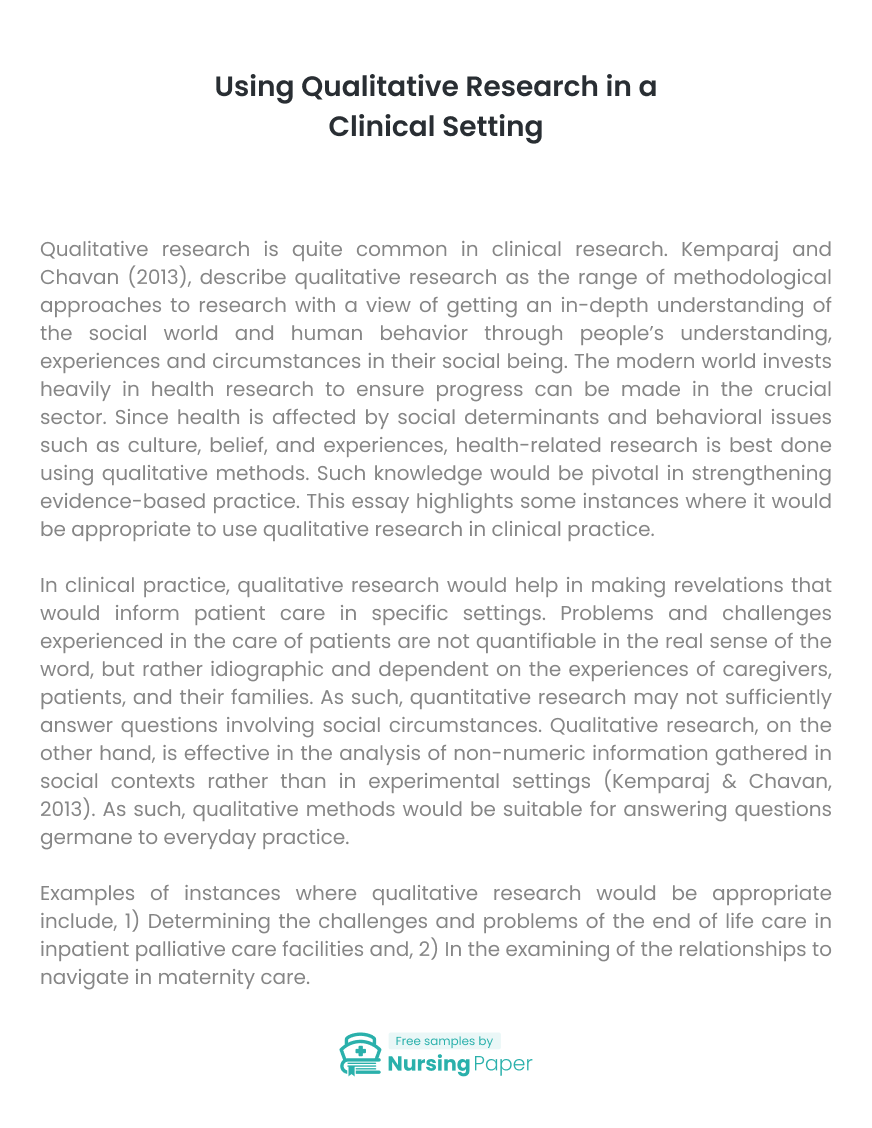
Using Qualitative Research in a Clinical Setting
Introduction
Qualitative research is quite common in clinical research. Kemparaj and Chavan (2013), describe qualitative research as the range of methodological approaches to research with a view of getting an in-depth understanding of the social world and human behavior through people’s understanding, experiences and circumstances in their social being. The modern world invests heavily in health research to ensure progress can be made in the crucial sector. Since health is affected by social determinants and behavioral issues such as culture, belief, and experiences, health-related research is best done using qualitative methods. Such knowledge would be pivotal in strengthening evidence-based practice. This essay highlights some instances where it would be appropriate to use qualitative research in clinical practice.
In clinical practice, qualitative research would help in making revelations that would inform patient care in specific settings. Problems and challenges experienced in the care of patients are not quantifiable in the real sense of the word, but rather idiographic and dependent on the experiences of caregivers, patients, and their families. As such, quantitative research may not sufficiently answer questions involving social circumstances. Qualitative research, on the other hand, is effective in the analysis of non-numeric information gathered in social contexts rather than in experimental settings (Kemparaj & Chavan, 2013). As such, qualitative methods would be suitable for answering questions germane to everyday practice.


Examples of instances where qualitative research would be appropriate include, 1) Determining the challenges and problems of the end of life care in inpatient palliative care facilities and, 2) In the examining of the relationships to navigate in maternity care. The information required in such situations is of a non-numeric nature which makes qualitative methods ideal in both cases. Qualitative research also involves interpretive explanations which can sufficiently transform the collected information into full elucidations of prevalent phenomena. For instance, in a research study conducted by Crowther and Smythe (2016), qualitative research (specifically, interpretive hermeneutic phenomenology) was instrumental in understanding the impact of relationships in maternity care. Similarly, Pittroff (2013) used interpretive phenomenology (a qualitative research technique) to explore the use of spiritual care in palliative care. Pitroff (2013) also explicates that determining the challenges of end of life through research would help nurses in providing the best care for the patients in palliative care as well as for their families. Qualitative research can, therefore, help caregivers gain knowledge which they can generalize to similar patient populations.
Crowther, S., & Smythe, E. (2016). Open, trusting relationships underpin safety in rural maternity a hermeneutic phenomenology study. BMC Pregnancy and Childbirth, 16(370), 1-11. http://dx.doi.org/10.1186/s12884-016-1164-9
Kemparaj, U., & Chavan, S. (2013). Qualitative research: A brief description. Indian Journal of Medical Sciences, 67(3), 89. http://dx.doi.org/10.4103/0019-5359.121127
Pittroff, G. (2013). The Humbled Expert. Journal of Christian Nursing, 30(3), 164-169. http://dx.doi.org/10.1097/cnj.0b013e318294e8d3



The download will start shortly.

The download will start shortly.
 Subject:
Medicine
Subject:
Medicine  Number of pages: 3
Number of pages: 3  Subject:
Medicine
Subject:
Medicine  Number of pages: 2
Number of pages: 2  Subject:
Nursing
Subject:
Nursing  Number of pages: 3
Number of pages: 3  Subject:
Medicine
Subject:
Medicine  Number of pages: 3
Number of pages: 3  Subject:
Medicine
Subject:
Medicine  Number of pages: 3
Number of pages: 3  Subject:
Health and Social Care
Subject:
Health and Social Care  Number of pages: 9
Number of pages: 9  Subject:
Nursing
Subject:
Nursing  Number of pages: 2
Number of pages: 2  Subject:
Health and Social Care
Subject:
Health and Social Care  Number of pages: 10
Number of pages: 10  Subject:
Health and Social Care
Subject:
Health and Social Care  Number of pages: 9
Number of pages: 9  Subject:
Health and Social Care
Subject:
Health and Social Care  Number of pages: 6
Number of pages: 6  Subject:
Health and Social Care
Subject:
Health and Social Care  Number of pages: 2
Number of pages: 2  Subject:
Health and Social Care
Subject:
Health and Social Care  Number of pages: 3
Number of pages: 3  Subject:
Medicine
Subject:
Medicine  Number of pages: 2
Number of pages: 2  Subject:
Medicine
Subject:
Medicine  Number of pages: 3
Number of pages: 3  Subject:
Medicine
Subject:
Medicine  Number of pages: 3
Number of pages: 3 
